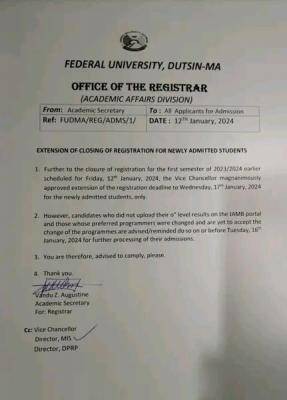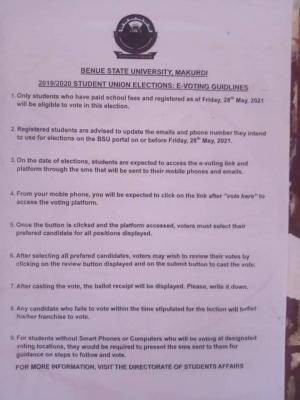
Distance learning, also known as online learning or e-learning, is a form of education where students and instructors are not physically present in the same location. Instead, students participate in courses and interact with instructors and fellow students through online platforms, such as email, discussion forums, video conferencing, and other digital technologies.
This program provides a flexible and convenient way for students to earn a degree or certificate, allowing them to study from anywhere with an internet connection. This makes it possible for students who live in remote areas, work full-time, or have other commitments to access education without having to attend traditional classes on campus.
Though in Nigeria, in as much as Distance learning courses are typically delivered through online learning management systems, which provide access to course materials, assignments, and other resources. Some lecturers make it mandatory for students to visit the institution sometimes, though this is rare and this happens especially during examination period.
Distance learning programs in Nigeria are offered by universities, polytechnics, colleges of education, and other higher educational institutions.
List of Universities in Nigeria Offering Distance Learning Programs
1. National Open University of Nigeria (NOUN): This is a federal university that offers a variety of undergraduate and postgraduate programs through distance learning. Students can study from anywhere in the world and have the option to choose between online or print materials.
2. University of Lagos (UNILAG): UNILAG distance learning programs in several fields, including business administration, public health, and mass communication.
3. University of Abuja (UNIABUJA): In UNIABUJA, the available DL programs are education, business administration, and public administration.
4. University of Maiduguri (UNIMAID): UNIMAID offers distance learning programs in several fields, including education, business administration, and environmental science.
5. Federal University of Technology, Minna (FUTMINNA): FUTMINNA offers distance learning programs in several fields, including project management, environmental technology, and entrepreneurship.
6. Ladoke Akintola University of Technology, Ogbomosho (LAUTECH): LAUTECH offers distance learning programs in several fields, including computer science, accounting, and business administration.7.
7. University of Uyo (UNIUYO): This university offers distance learning programs in several fields, including education, public health, and law.
Other Schools on the list are as follows:
- Ahmadu Bello University, Zaria (ABU)
- University of Ibadan (UI)
- Obafemi Awolowo University, Ile-Ife (OAU)
- University of Port Harcourt (UNIPORT)
- University of Nigeria, Nsukka (UNN)
- Bayero University Kano (BUK)
- Federal University of Technology, Owerri (FUTO)
- Nnamdi Azikiwe University, Awka (UNIZIK)
- Federal University of Agriculture, Abeokuta (FUNAAB)
- University of Jos (UNIJOS)
- University of Ilorin (UNILORIN)
- Adekunle Ajasin University, Akungba-Akoko (AAUA)
- Federal University, Oye-Ekiti (FUOYE)
- Joseph Ayo Babalola University (JABU)
- Lagos State University (LASU)
- Babcock University Ilishan
- University of Ilorin (UNILORIN)
- Afe Babalola University, Ado-Ekiti (ABUAD)
- Olabisi Onabanjo University, Ago-Iwoye (OOU)
- Ignatius Ajuru University of Education, Portharcourt (IAUE)
Admission Requirements for Distance Learning Institutes in Nigeria
The requirements for admission for distance learning programs in Nigeria vary depending on the institution and the program. However, the following are some general admission requirements that may apply to most distance learning programs in Nigeria:
1. O’Level Requirements: You are typically required to have a minimum of five credits in relevant subjects at the O’Level, including Mathematics and English Language.
2. Educational Qualification: You must possess a relevant educational qualification such as a National Diploma (ND), Higher National Diploma (HND), or Bachelor’s degree, depending on the program.
3. Work Experience: Some programs may require applicants to have relevant work experience in addition to their educational qualifications.
4. Age Requirements: Applicants must meet the minimum age requirements for admission to the program. It is usually 18years and above, it depends on the school you are applying for.
5. Application Form: Applicants must complete and submit an application form, which can usually be obtained from the institution’s website or a designated sales outlet.
6. Application Fee: Applicants are typically required to pay an application fee when submitting their application form.
7. Supporting Documents: Applicants may be required to submit supporting documents such as academic transcripts, certificates, and other relevant documents.
Admission requirements may vary depending on the institution and the program, and you are advised to check the admission requirements of their preferred institution and program for more detailed information.
How To Apply for Admission Into Distance Learning in Nigeria
The process of applying for admission to distance learning programs in Nigeria may vary depending on the institution and the program, but you can follow the ideal steps if you are interested:
- Research: Conduct research on the distance learning programs available at the institution of your choice. You can do this by visiting the institution’s website or contacting their admissions office for information on the available programs.
- Meet the Requirements: Ensure that you meet the admission requirements for the program you are interested in. This includes having the required educational qualifications, work experience, and minimum age requirement.
- Obtain the Application Form: Obtain the application form from the institution’s website or a designated sales outlet. Some institutions may also provide online application forms that can be completed and submitted electronically.
- Fill the Application Form: Complete the application form accurately and ensure that all the required fields are filled.
- Attach Supporting Documents: Attach all required supporting documents such as academic transcripts, certificates, and other relevant documents. Ensure that you provide clear and legible copies of all documents.
- Submit the Application: Submit your completed application form and supporting documents to the institution’s admission office or through the designated application portal.
- Pay the Application Fee: Some institutions may require applicants to pay an application fee. Ensure that you pay the fee as required by the institution.
- Wait for Notification: After submitting your application, you will receive a notification of your admission status. If admitted, you will receive further instructions on how to proceed with your registration.
The application process may vary depending on the institution and the program, and you should always check with the institution for specific instructions on how to apply.
I hope this helps? Distance learning institutes in Nigeria are fast gaining popularity as a result of tight demands and competition for admission into various Distance learning courses.
Feel free to reach out to me via the comment section below if you have any question and I will be glad to assist.




